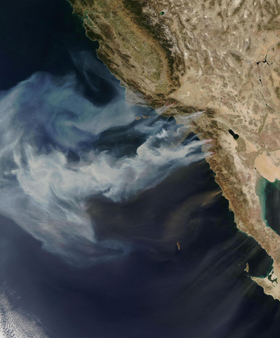 An international team of leading scientists has called on the Intergovernmental Panel on Climate Change (IPCC) to recognise the role of fires in global climate change, writes Sarah Day.
An international team of leading scientists has called on the Intergovernmental Panel on Climate Change (IPCC) to recognise the role of fires in global climate change, writes Sarah Day.
Geoscientist online, 24 April 2009
Their report, published today in
Science, demonstrates that fire, and fire-climate feedbacks, are an integral part of climate change, despite being largely absent from global climate or atmospheric models. In particular, intentional deforestation fires alone contribute up to one-fifth of the human-caused increase in carbon dioxide emissions, claim the authors.
Wildfires, too, are playing a part. "The tragic fires in Victoria, Australia, emphasize the ubiquity of recent large wildfires and potentially changing fire regimes that are concomitant with anthropogenic climate change. Our review is both timely and of great relevance globally", says Professor David Bowman of the University of Tasmania, one of the lead authors of the study.
Although carbon dioxide is one of the most influential and well-studied greenhouse gases resulting from fires, several others can also have an impact. Methane, aerosol particulates in smoke, and the altered landscape that results from charring, can also contribute to atmospheric changes.
Fires are becoming larger and more frequent than ever before, leading to warnings that all countries should be prepared. Professor Andrew C Scott from Royal Holloway, University of London, says: "We urgently need to consider fire as a part of climate models and recognise that future climate change will mean that some areas which do not burn regularly, such as the United Kingdom, will experience increasing levels of fire and we need to be prepared for this. Simply putting the fires out is not a sufficient response".
Although fires are on the increase, they have always played an important role in the planet’s climate system. With its clothing of carbon-rich vegetation, and with widespread lightning and volcanic eruptions, levels of oxygen and carbon dioxide in Earth's atmosphere have always been affected, and to some extent controlled, by fire.
This has important ramifications for our changing climate, which this study has been able to demonstrate by bringing together previously disparate subjects - including ecology, global modelling, physics, anthropology, geology and climatology. The collaborative research was supported by the National Centre for Ecological Analysis and Synthesis (NCEAS) and the Kavli Institute of Theoretical Physics (KITP).
"This synthesis is a prerequisite for adaptation", says Jennifer Balch, a postdoctoral fellow at NCEAS and the study’s other lead author. "Fire feedbacks…have been exacerbated by climate change, rapid land cover transformation, and exotic species introductions – that collectively challenge the integrity of entire biomes".
Although the study is just the beginning of estimating fire’s influence on climate, the authors say it highlights major gaps in research that must be addressed if that influence is to be fully understood.